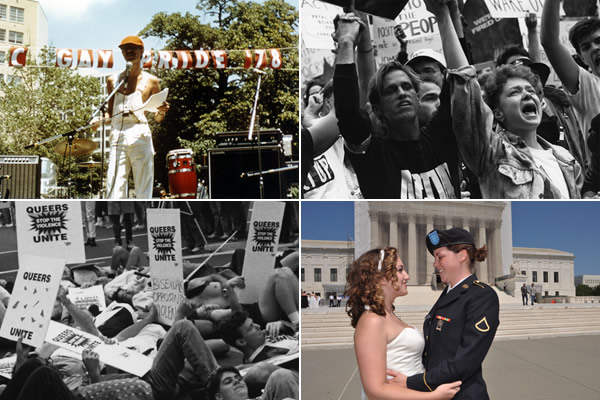a&e features
Top 45 headlines of the Blade’s 45 years
The biggest LGBT stories, from DOMA to ‘Will & Grace’
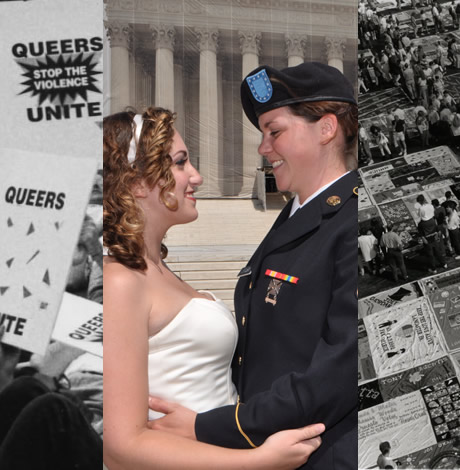
To help commemorate the Blade’s 45th anniversary, the editorial staff worked to identify the top 45 headlines from our archives.
These headlines often represent single events, but sometimes are used thematically to encompass a series of related events. Each one survived several rounds of voting to make the cut and determine its order in the final list.
The stories are a mix of local and national events that helped shape the LGBT movement.
45. 2013: Former Washington Wizards center Jason Collins in April became the first male athlete who actively plays in a major American professional sports league to come out as gay. The watershed announcement prompted other athletes to declare their sexual orientation. These include former University of Missouri defensive end Michael Sam who came out in February and was drafted by the NFL’s Rams.
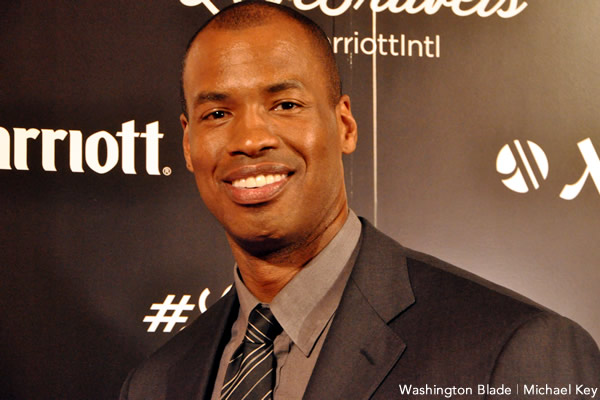
Jason Collins (Washington Blade photo by Michael Key)
44. 1982: An investigation by the Washington Blade reveals that the FBI is spying on D.C. gays. Sources said the FBI and D.C. police were looking into prostitution with adults or minors, the sale and distribution of child pornography and possible infiltration by foreign intelligence agents. The Blade, which interviewed more than 25 people to verify that the investigation was taking place, found that D.C. gay bars, bar owners and some patrons were under surveillance. Spokespeople for the D.C. police and the FBI denied that gays were being singled out for different treatment.
43. 1998: “Will & Grace” debuts in September, marking a significant change in Hollywood’s presentation of LGBT people, their lives and relationships. The sitcom featured Will Truman, a gay lawyer living in New York City, and his straight friend and roommate Grace Adler, an interior designer. Storylines in the comedy involved Will and Grace’s problems seeking romantic relationships as well as struggles in maintaining their own friendship. The most successful TV series featuring gay characters, “Will & Grace” ran for eight years, earned 16 Emmys and made it into the Nielsen Top 20 for half of its network run.
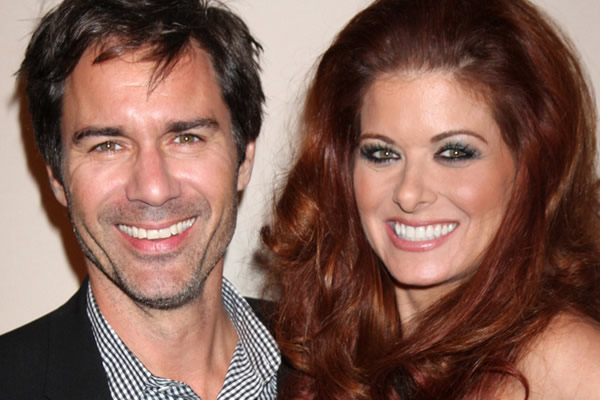
Eric McCormack and Debrah Messing of ‘Will & Grace.’
42. 1992: In October, more than 500,000 people come to see the NAMES Project’s AIDS Memorial Quilt on the National Mall. The 23,000 panels on display covered more than 15 acres around the Washington Monument, and the Quilt included panels from every state and 28 countries. The Quilt was displayed for the first time on the National Mall in 1987, during the National March on Washington for Lesbian & Gay Rights. In January of 1993, the NAMES Project was invited to march in President Clinton’s inaugural parade.
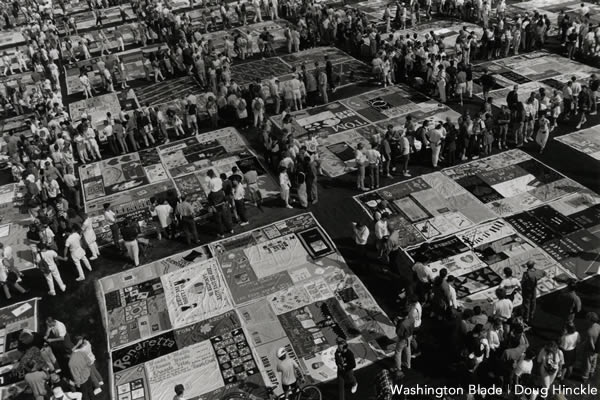
Names Project Quilt on Oct. 10, 1992. (Washington Blade archive photo by Doug Hinckle)
41. 1991: The country’s first Black Gay Pride Day is held in Washington drawing 800 participants. Activists Welmore Cook, Theodore Kirkland and Ernest Hopkins organized the event in response to their concern of supporting the increasing number of HIV-positive black people in the District. The event raised nearly $3,000 for AIDS charities with the support of the D.C. Coalition of Black Lesbians & Gay Men and the Inner City AIDS Network.

Black Gay and Lesbian Pride Day in 1991. (Washington Blade archive photo by Doug Hinckle)
40. 1976: Former nun-turned-gay rights activist Jean O’Leary is elected as the first openly gay delegate to the 1976 Democratic National Convention. O’Leary, who started the Lesbian Feminist Liberation in 1972 and co-founded National Coming Out Day in 1987, was also the organizer of the first meeting of gay rights activists in the White House under President Carter in 1977. O’Leary continued to serve on the Democratic National Committee for 12 years after she became a delegate.
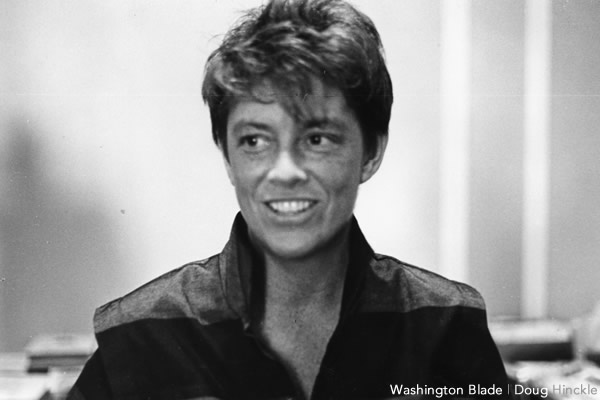
Jean O’Leary (Washington Blade archive photo by Doug Hinckle)
39. 2008: After running a largely gay-friendly campaign, Barack Obama is elected as the nation’s first black president. He frequently pledged during the campaign to seek “equality for all,” vowing to fight for full federal recognition of same-sex couples and develop a comprehensive national HIV/AIDS strategy, among other steps. But in the months following his inauguration, Obama drew criticism from some activists for not doing more to advance LGBT priorities in Congress.
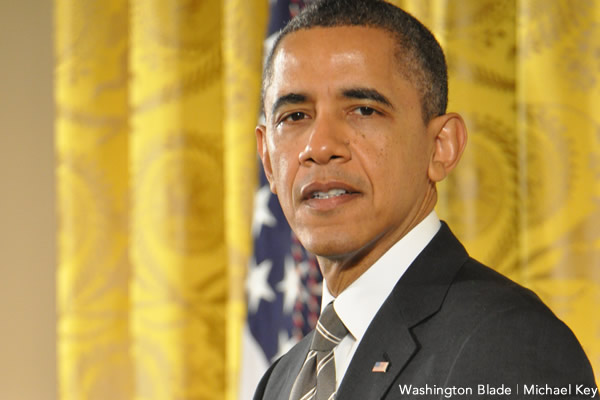
President Barack Obama (Washington Blade file photo by Michael Key).
38. 1973: D.C. Mayor Walter Washington signs into law Title 34, which bans discrimination on the basis of sexual orientation in housing, public accommodations, bank credit and employment. The law also banned discrimination on the basis of marital status and personal appearance. It narrowed the “business necessity” exclusion, which said that businesses would have to prove that practicing nondiscrimination would cost them money and render it impossible to remain in business at all in order to ignore the law.
37. 2011: Franklin E. Kameny, who is credited with playing the lead role in establishing an assertive and credible civil rights movement for lesbians and gays in the early 1960s and who coined the phrase “Gay is Good,” died at his home in Washington, D.C. on Oct. 11 at the age of 86. His voluminous papers chronicling his gay and later LGBT rights work covering the repeal of sodomy laws, allowing gays and lesbians to serve in the military, and the enactment of local and state laws banning LGBT discrimination, among many other efforts, are available for scholars and researchers at the Library of Congress.
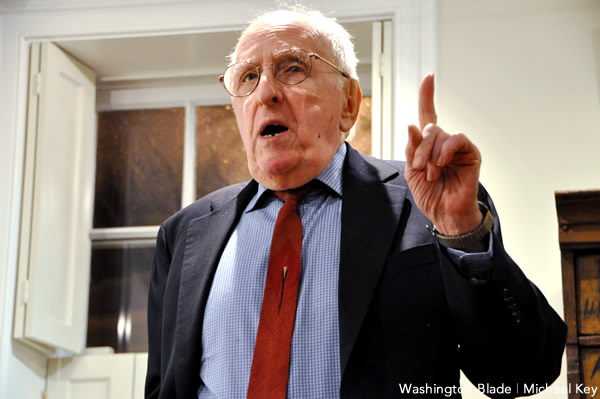
Frank Kameny (Washington Blade file photo by Michael Key)
36. 2004: On Nov. 2, voters in 11 states vote overwhelmingly in support of state constitutional amendments prohibiting same-sex unions. The development came after two other states voted earlier in the year to add constitutional amendments banning gay marriage. President George W. Bush also supported that year the Federal Marriage Amendment, but his endorsement did not rally sufficient support to pass the measure through Congress. The amendment stalled in the U.S. Senate, and was rejected outright in the U.S. House.
35. 1988: About 1,100 AIDS activists, angry at the Food & Drug Administration for taking too long to approve new drugs for people with AIDS, stage a protest at FDA headquarters and close it for the day. Protesters sat or sprawled on the pavement outside the building’s main entrance, preventing employees from entering or leaving. Some demonstrators, who climbed onto an overhanging roof above the building’s main entrance, attached placards and banners proclaiming “silence = death” and “test drugs, not people” to office windows. The demonstration resulted in 176 arrests.
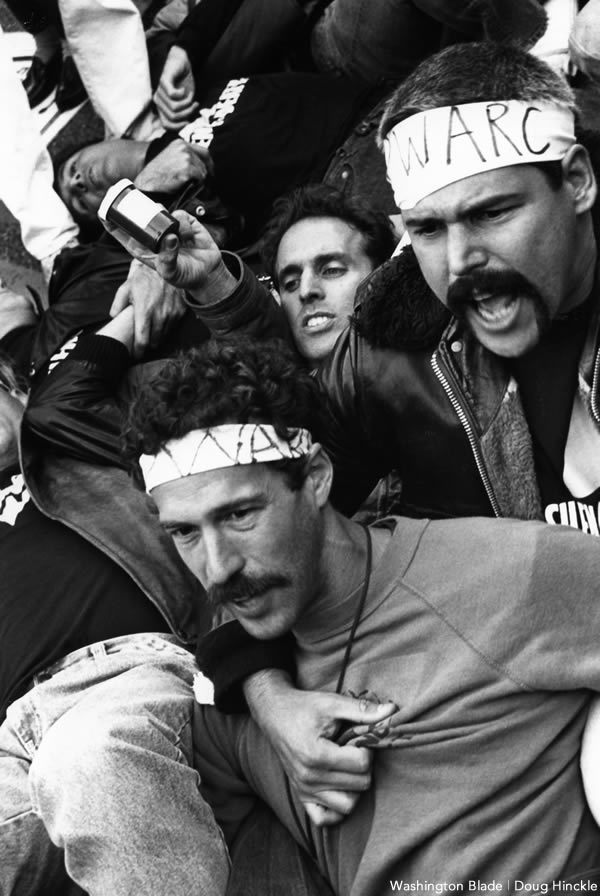
Civil disobedience at the FDA on Oct. 11, 1988. (Washington Blade archive photo by Doug Hinckle)
34. 1987: The Second National March on Washington for Lesbian & Gay Rights draws between 200,000 and 600,000 participants. In addition to demanding civil rights, participants also called on President Ronald Reagan to take greater action to confront the growing AIDS epidemic. The event included the unveiling of Cleve Jones’ NAMES Project AIDS Memorial Quilt and a protest before the Supreme Court building for its 1986 ruling upholding sodomy laws. Speakers included Latino civil rights leader Cesar Chevez; comedian Whoopi Goldberg; and Jesse Jackson, then a Democratic presidential contender.
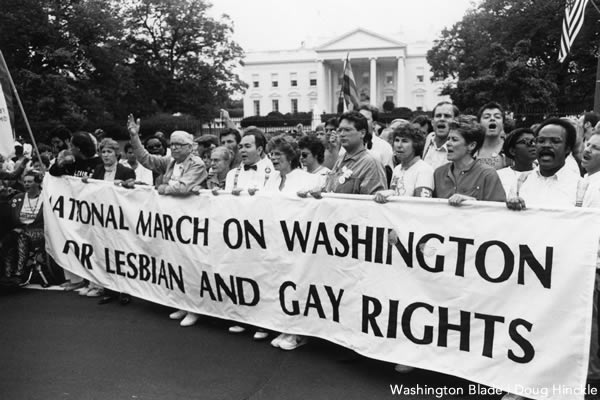
The National March on Washington for Lesbian and Gay Rights on Oct. 14, 1987. (Washington Blade archive photo by Doug Hinckle)
33. 1980: Gay activist Mel Boozer becomes the first openly gay person to have his name placed in nomination as a candidate at the Democratic National Convention. Supporters named Boozer, then a president of the Gay Activists Alliance, as a vice presidential candidate. Boozer, who was black, also addressed the convention during primetime. “I know what it means to be called a ‘nigger’ and I know what it means to be called a ‘faggot,’ and I understand the differences in the marrow of my bones. And I can sum up that difference in one word: none.”
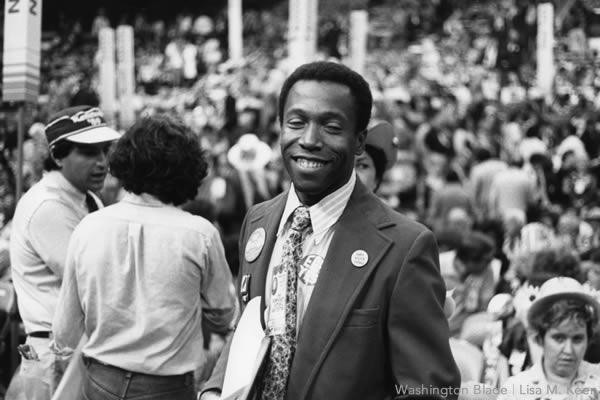
Mel Boozer on the floor of the Democratic National Convention on Aug. 13, 1980. (Washington Blade archive photo by Lisa M. Keen)
32. 1986: The U.S. Supreme Court ruled in Hardwick v. Bowers that homosexual activity is not protected by the Constitution. The court upheld a Georgia sodomy law that criminalized oral and anal sex in private between consenting adults, and said that “majority belief that sodomy is immoral” was sufficient reason to validate sodomy laws. The issue in the case was the right of privacy, and the court ruled that the Constitution’s 14th Amendment right did not extend to private, homosexual conduct.
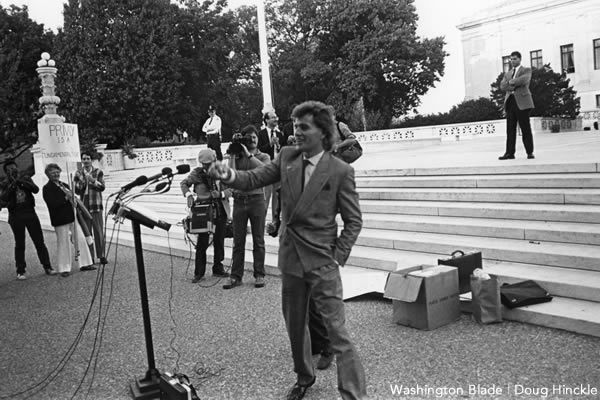
Michael Hardwick in front of the Supreme Court on Oct. 8, 1986. (Washington Blade archive photo by Doug Hinckle)
31. 1983: Gay leaders, independent medical researchers and health and social service agency officials testify before a congressional panel that the federal government’s response to AIDS had been too little, too late. Organizations such as the National Gay Task Force called on the federal government to give substantial funding to AIDS research and create a commission specifically designed to fight the AIDS epidemic. Several witnesses echoed the plea, alleging that the lack of resources had already cost researchers the ability to study the first generation of AIDS cases.
30. 1993: On April 25, the March on Washington for Gay, Lesbian & Bi Equal Rights & Liberation drew an estimated 750,000 participants to Washington. The political rally drew more mainstream media coverage — including a Newsweek cover story — and more participants than previous marches. Protesters also took part in more than 250 march-related events, including conferences, workshops, lobbying events and religious ceremonies.
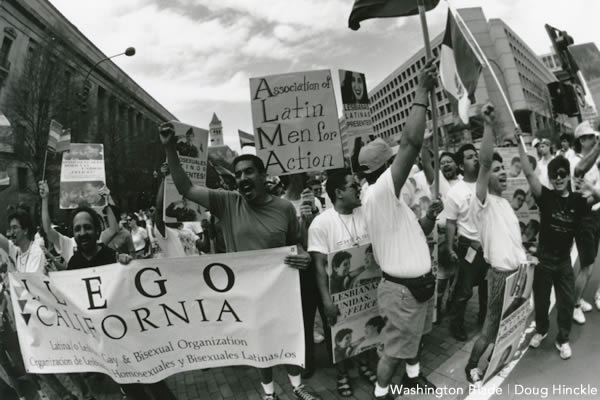
National March on Washington for Lesbian, Gay and Bisexual Rights and Liberation on April 25, 1993. (Washington Blade archive photo by Doug Hinckle)
29. 1982: Wisconsin Gov. Lee Dreyfus signs into law the nation’s first statewide gay civil rights bill, making it illegal in the Badger State to discriminate on the basis of sexual orientation in housing, employment and public accommodations. “There are some questions the government has no business asking,” Dreyfus said of the bill.
28. 2012: U.S. Rep. Tammy Baldwin (D-Wisc.) made history in November when she became the nation’s first out lesbian or gay person to win election to the United States Senate. Her decisive victory over Republican Tommy Thompson, the state’s former governor, solidified Baldwin’s status as a popular and respected public official with strong support from gay and straight voters alike.
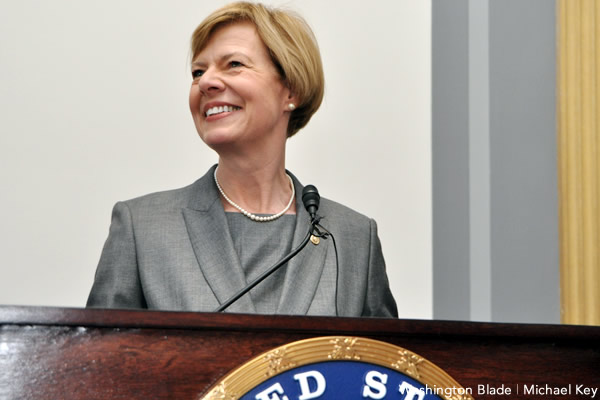
Sen. Tammy Baldwin (D-Wis.) (Washington Blade photo by Michael Key)
27. 1979: On Oct. 14, tens of thousands of people participate in the National March on Washington for Lesbian & Gay Rights. It was the first such march on Washington. Among the many participating groups were the National Gay Task Force, the Gertrude Stein Democratic Club, and the D.C. Area Feminist Alliance. In the days following the march, activists from across the country descended upon Capitol Hill to speak to lawmakers about anti-discrimination laws.
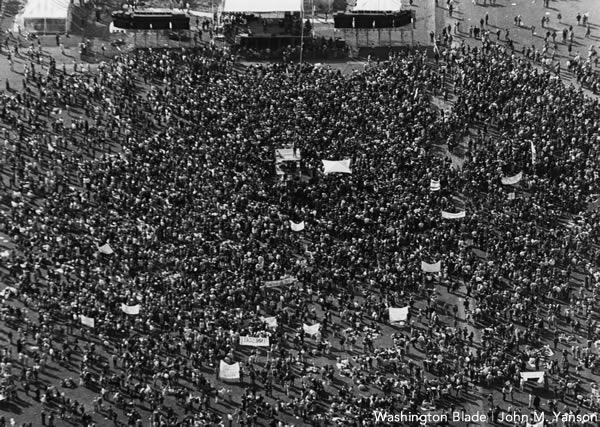
National March on Washington for Lesbian and Gay Rights on Oct. 14, 1979. (Washington Blade archive photo by John M. Yanson)
26. 1985: In late July, actor Rock Hudson issues a statement saying he has AIDS and is receiving treatments in Paris that are unavailable in the U.S. He died three months later at age 59. His announcement and death drew massive mainstream media attention to AIDS, and numerous AIDS fundraisers ensued to help fund research, treatment and services for people with AIDS. Actress Elizabeth Taylor, a friend of Hudson’s, went on to start an AIDS fundraising organization, the American Foundation for AIDS Research.
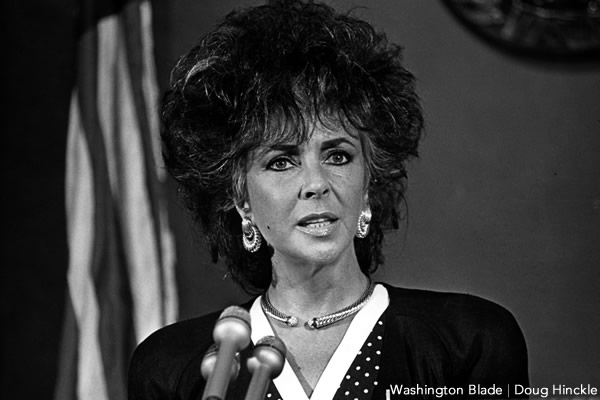
Elizabeth Taylor (Washington Blade archive photo by Doug Hinckle)
25. 1997: Actress Ellen DeGeneres comes out in an article in the April 17 issue of Time magazine. The headline: “Yep, I’m Gay.” Her alter ego, Ellen Morgan, also came out in the April 30 episode of “Ellen,” becoming the first gay lead character on television. The hour-long episode featured Laura Dern as Ellen’s romantic interest; Oprah Winfrey played a therapist who assured Ellen that there’s nothing wrong with being gay.
24. 2007: A debate raged among LGBT activists over how to best advance LGBT rights after the U.S. House of Representatives passed an Employment Non-Discrimination Act that lacked explicit protections for transgender people. Rep.Tammy Baldwin (D-Wis.), a lesbian, introduced an amendment to add a trans provision to the bill, but withdrew it before a vote. Her move was considered a symbolic gesture to assure trans people they were not forgotten. The bill passed the House, 235-184, but after President Bush threatened a veto, the Senate failed to take up the measure.
23. 2012: The American Psychiatric Association on Dec. 2, removed Gender Identity Disorder from its list of mental disorders. The organization specifically removed GID from its Diagnostic and Statistical Manuel (DSM) of Mental Disorders and replaced it with Gender Dysphoria. The process to revise the DSM began more than a decade earlier.
22. 2009: Throughout the year, more same-sex couples win the right to marry. The Iowa Supreme Court unanimously strikes down the state’s ban on same-sex marriage; Vermont becomes the first state to legalize same-sex marriage via the legislative path after it overrides Gov. Jim Douglas’s veto; Maine lawmakers followed, with Gov. John Baldacci signing the bill; and New Hampshire becomes the sixth state to legalize same-sex marriage.
21. 2013: More states begin to legalize same-sex marriage in the aftermath of the Supreme Court’s decision striking down DOMA. Marriage laws in Rhode Island and Hawaii took effect on Aug. 1, 2013, and Dec. 2, 2013, respectively. Illinois’ same-sex marriage law took effect statewide on June 1. Gays and lesbians also gained marriage rights in New Mexico, Oregon and Pennsylvania since the DOMA decision.
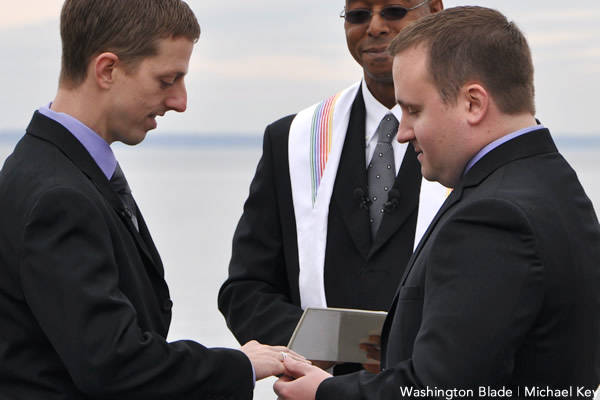
(Washington Blade file photo by Michael Key)
20. 1996: At the 1996 International Conference on AIDS in Vancouver, it’s announced that HIV/AIDS cocktails, three-drug combinations used to combat the disease, held promise in combating symptoms. The introduction of the cocktails fundamentally changed the way AIDS was perceived, shifting it away from an inevitably fatal disease to one that, while chronic, was more manageable. The cocktails showed promise in blood tests of people with access to the drugs even though the number of available cocktails was limited at the time.
19. 1982: Gay Related Immune Disorder, or GRID, becomes the first name to describe what now is known as AIDS. Cases reached epidemic proportions, moving beyond clusters of gay men in New York and San Francisco and into groups with no obvious risk factors. Scientists later agreed that Acquired Immune Deficiency Syndrome more accurately described the disease, which did not exclusively affect gay men. In 1984, government researchers identify what they believe is the “probable cause” of AIDS: HTLVIII, the Human T-cell Leukemia Virus. In June 1988, the Presidential Commission on the Human Immunodeficiency Virus Epidemic, a 13-member panel, released a comprehensive report of 583 recommendations to address the AIDS epidemic.
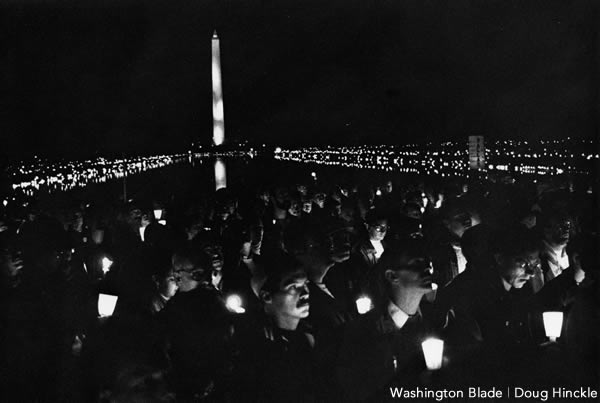
(Washington Blade archive photo by Doug Hinckle)
18. 1993: President Clinton angers gays across the country when he backs off his campaign promise to end the ban on gays in the military, instead endorsing a policy by Sen. Sam Nunn (D-Ga.). Supporters touted the law — which became known as “Don’t Ask, Don’t Tell” — as a compromise because it would allow gays to serve in the military provided that they didn’t disclose their sexual orientation. Under the policy, about 13,000 service members were discharged, some because their sexual orientation was disclosed by others to commanding officers.
17. 1996: The Defense of Marriage Act abruptly surfaces in May before quickly working its way through Congress and winning President Clinton’s signature in September. The law prohibits the federal government from recognizing same-sex marriage, and allows states not to recognize same-sex unions performed in other states. Same-sex marriage was not legal anywhere in the U.S. when Clinton signed DOMA into law, but now marriage rights for gay couples are available in six states. Because of DOMA, legally married same-sex couples in these states aren’t eligible for federal benefits.
16. 1970: A crowd of 2,000 gay demonstrators in New York commemorates the first anniversary of the Stonewall Riots with a march and rally. The event, known as Christopher Street Liberation Day, occurred June 28 and reportedly took up about 15 blocks of the street. The New York Times reported there was little animosity, and “some bystanders applauded when a tall, pretty girl carrying a sign ‘I am a Lesbian’ walked by.” Pride marches took place simultaneously in Los Angeles and Chicago.
15. 2009: Mayor Adrian Fenty on Dec. 18 signed a bill approved days earlier by the D.C. City Council in an 11-2 vote legalizing same-sex marriage in the nation’s capital. The legislation successfully cleared a required legislative review by Congress and withstood efforts by opponents who attempted unsuccessfully to require that it come before voters in a referendum. The Religious Freedom and Civil Marriage Equality Amendment Act of 2009 took effect March 3, 2010.
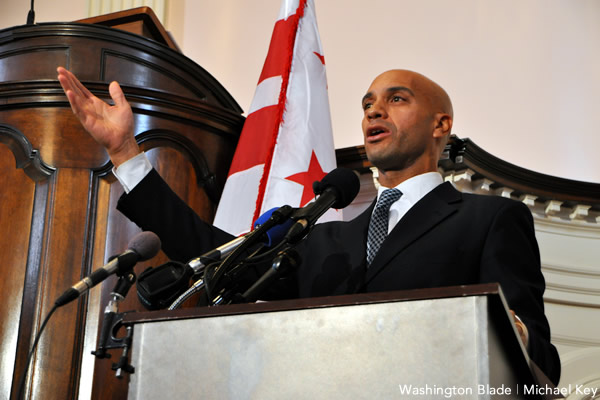
Mayor Adrian Fenty at the same-sex marriage bill signing. (Washington Blade photo by Michael Key)
14. 2012: Same-sex marriage laws were upheld at the ballot box for the first time. Voters in Maryland, Maine and Washington on Nov. 6 backed gay nuptials statutes in their respective states. Minnesotans on the same day rejected a proposed state constitutional amendment that would have defined marriage as between a man and a woman.
13. 2008: In May, a California Supreme Court ruling legalizes same-sex marriage in the state. Later that year, the Connecticut Supreme Court rules similarly. A ballot initiative to overturn the California ruling was put to voters on Election Day in November. Following an expensive campaign funded largely by the Mormon Church and anti-gay groups such as Focus on the Family, California voters passed Proposition 8, which rescinded same-sex marriage rights in the state.
12. 1977: In June, singer Anita Bryant leads a highly publicized campaign to repeal a gay civil rights ordinance in Dade County, Florida. The ordinance made it illegal to discriminate on the basis of sexual orientation in housing, employment, loans and public accommodations. Bryant founded Save Our Children to protest the ordinance and she led several more campaigns around the country to repeal other local anti discrimination ordinances. A boycott was organized against the Florida Citrus Commission, who used Bryant in advertising. Bryant’s campaign in Dade County was overturned in 1998.
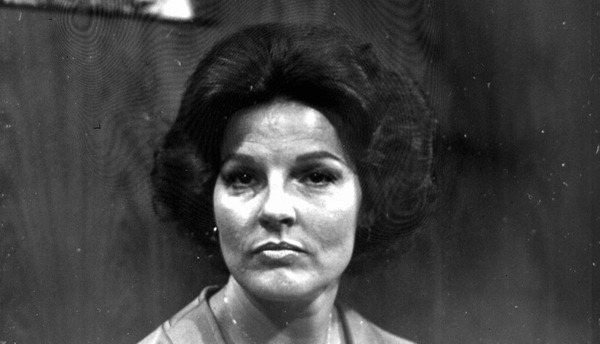
Anita Bryant (Photo public domain)
11. 1974: U.S. Reps. Bella Abzug and Edward Koch, Democrats from New York, introduce the Equality Act of 1974.The bill would have added “sexual orientation” to the 1964 U.S. Civil Rights Act, making it illegal to discriminate against gays and lesbians in employment, housing and public accommodations. The Equality Act, the first federal legislation in support of gay rights, never passed.
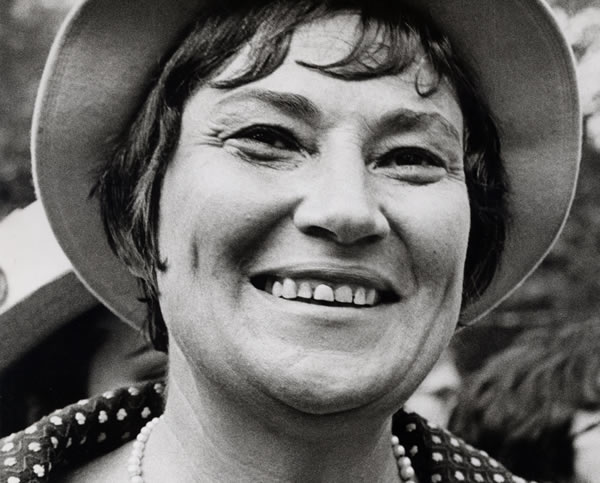
Rep. Bella Abzug (D-N.Y.) (Photo public domain)
10. 2009: Eleven years after the murder of the gay college youth for whom the bill was partly named, President Obama signed into law the Matthew Shepard & James Byrd, Jr. Hate Crimes Prevention Act. It was the first time federal protections for the LGBT community were enshrined into U.S. code. Byrd, a black man, was dragged to death behind a truck in 1998 by three white men in Texas.
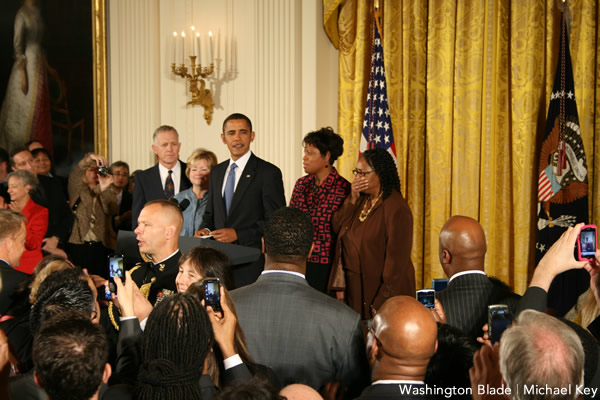
Signing of the Matthew Shepard and James Byrd Hate Crimes Prevention Act in 2009. (Washington Blade photo by Michael Key)
9. 1998: Matthew Shepard, a gay college student, is tortured and left to die near Laramie, Wyo., in October. He was found tied to a fence and was brought to a hospital, where he later died. The killers were sentenced in April 1999 and November 1999 to life in prison. Grief following his death led to the introduction of federal legislation that would enable the Justice Department to prosecute hate crimes against LGBT people. The bill languished in Congress for years before becoming law (see number 10).
8. 2010: After nearly two years of struggles in Congress, President Obama signed legislation known as the “Don’t Ask, Don’t Tell” Repeal Act to lift the U.S. military’s ban on openly gay service. The armed forces discharged more than 13,000 service members under the law before it was formally lifted one year later.
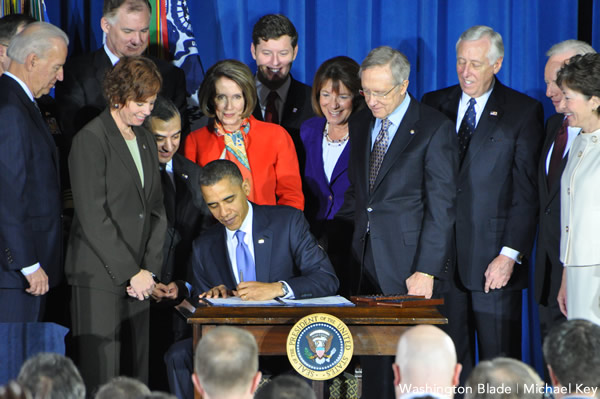
President Obama signed the repeal of ‘Don’t Ask, Don’t Tell’ in December 2010, but it didn’t take effect until September 2011. (Washington Blade photo by Michael Key)
7. 2003: On June 26, the U.S. Supreme Court rules in Lawrence v. Texas that sodomy laws are unconstitutional. In 1998, John Lawrence and Tyron Garner were arrested in Lawrence’s Houston home and jailed overnight after officers responding to a disturbance report found the men having sex. The court voted 6-3 to strike down the law, and the opinion covered similar laws in 12 other states. With its decision, the court also reversed Bowers v. Hardwick, its 1986 decision that upheld Georgia’s sodomy law on the argument that it had been harmful to gay people’s struggles for liberty and equality.
6. 2012: Ending the evolution he started 18 months earlier, President Obama announced during a TV interview with then-closeted ABC anchor Robin Roberts that he supports marriage rights for same-sex couples. Obama made history by winning re-election just six months after taking that position in a race against Mitt Romney, who remained opposed to marriage equality.
5. 1978: San Francisco City Supervisor Harvey Milk is gunned down by Supervisor Dan White, who also shoots and kills Mayor George Moscone. Milk, who was gay and a pioneer for LGBT rights, in 1978 helped to defeat the Briggs Initiative, which would have prevented gays from working as teachers in California. On the day of his assassination, U.S. Sen. Dianne Feinstein, then the president of the Board of Supervisors, heard gunshots and called police, found Milk’s body and announced the news to the media. A candlelight vigil to the City Hall of between 25,000 and 40,000 marchers followed the assassination. More than 2,000 angry gay demonstrators protested the 1979 sentence of voluntary manslaughter of Dan White on May 21.

Harvey Milk (Photo by Daniel Nicoletta; courtesy Wikimedia Commons)
4. 1981: It is reported that an estimated 170 gay men have succumbed to a rare pneumocystis carinii pneumonia and Kaposi’s sarcoma over the preceding two years. The U.S. Centers for Disease Control issued reports on three studies that cited a serious malfunctioning of the body’s immune systems in these cases. By December, 43 percent of those infected with either pneumocystis or Kaposi’s had died. The reports were the nation’s first indication of the coming HIV/AIDS epidemic.
3. 2003: The Massachusetts Supreme Court rules in November that same-sex marriage is legal, making the Bay State the first in the country to grant marriage rights to gay couples. In its ruling for the case, known as Goodrich v. Department of Public Health, the court specified state law prohibited gays from marrying and gave state lawmakers 180 days to take appropriate action to address the issue. Then-Gov. Mitt Romney ordered town clerks to begin issuing marriage licenses to same-sex couples.
2. 1973: The American Psychiatric Association in December resolves that homosexuality should no longer be considered a mental disorder. Officials rendered the decision after intense lobbying from gays, including veteran activist Frank Kameny, as well as an endorsement from all 68 district branches of the APA. The new resolution — adopted by 13 members of the APA Board of Trustees with two remaining members abstaining — called for an end to discrimination and repeal of sodomy laws throughout the country. The National Gay Task Force at the time called the decision “an instant cure.”
1. 2013 & 2014: The U.S. Supreme Court issued its most historic rulings on LGBT rights to date. First, in 2013, by striking down Section 3 of the Defense of Marriage Act and issuing a decision restoring marriage equality to California after passage of Proposition 8. Same-sex marriage returned to the largest state in the nation, and for the first time, federal benefits began to flow to married same-sex couples. Then, just this week, the court declined to hear marriage cases from five states, instantly bringing marriage equality to Virginia, Utah, Oklahoma, Indiana and Wisconsin.
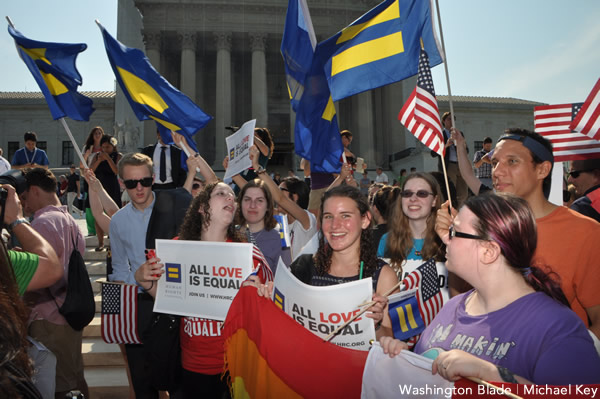
(Washington Blade file photo by Michael Key)
a&e features
Tristan Schukraft on keeping queer spaces thriving
New owner of LA’s Abbey expands holdings to Fire Island, Mexico

LOS ANGELES — Like the chatter about Willy Wonka and his Chocolate Factory, the West Hollywood community here started to whisper about the man who was going to be taking over the world-famous Abbey, a landmark in Los Angeles’s queer nightlife scene. Rumors were put to rest when it was announced that entrepreneur Tristan Schukraft would be taking over the legacy created by Abbey founder David Cooley. All eyes are on him.
For those of us who were there for the re-opening of The Abbey, when the torch was officially passed, all qualms about the new regime went away as it was clear the club was in good hands and that the spirit behind the Abbey would forge on. Cher, Ricky Martin, Bianca del Rio, Jean Smart, and many other celebrities rubbed shoulders with veteran patrons, and the evening was magical and a throwback to the nightclub atmosphere pre-COVID.
The much-talked-about purchase of the Abbey was just the beginning for Schukraft. It was also announced that this business impresario was set to purchase the commercial district of Fire Island, as well as projects launching in Mexico and Puerto Rico. What was he up to? Tristan sat down with the Blade to chat about it all.
“We’re at a time right now when the last generation of LGBT entrepreneurs and founders are all in their 60s and they’re retiring. And if somebody doesn’t come in and buy these places, we’re going to lose our queer spaces.”
Tristan wasn’t looking for more projects, but he recounts what happened in Puerto Rico. The Atlantic Beach Hotel was the gay destination spot and the place to party on Sundays, facing the gay beach. A new owner came in and made it a straight hotel, effectively taking away a place of fellowship and history for the queer community. Thankfully, the property is gay again, now branded as the Tryst and part of Schukraft’s portfolio with locations in Puerto Vallarta and Fire Island.
“If that happens with the Abbey and West Hollywood, it’s like Bloomingdale’s in a mall. It’s kind of like a domino effect. So that’s really what it is all about for me at this point. It has become a passion project, and I think now more than ever, it’s really important.”
Tristan is fortifying spaces for the queer community at a time when the current administration is trying to silence the LGBTQ+ community. The timing is not lost on him.
“I thought my mission was important before, and in the last couple of months, it’s become even more important. I don’t know why there’s this effort to erase us from public life, but we’ve always been here. We’re going to continue to be here, and it brings even more energy and motivation for me to make sure the spaces that I have now and even additional venues are protected going in the future.”
The gay community is not always welcoming to fresh faces and new ideas. Schukraft’s takeover of the Abbey and Fire Island has not come without criticism. Who is this man, and how dare he create a monopoly? As Schukraft knows, there will always be mean girls ready to talk. In his eyes, if someone can come in and preserve and advance spaces for the queer community, why would we oppose that?
“I think the community should be really appreciative. We, as a community, now, more than ever, should stand together in solidarity and not pick each other apart.”
As far as the Abbey is concerned, Schukraft is excited about the changes to come. Being a perfectionist, he wants everything to be aligned, clean, and streamlined. There will be changes made to the DJ and dance booth, making way for a long list of celebrity pop-ups and performances. But his promise to the community is that it will continue to be the place to be, a place for the community to come together, for at least another 33 years.
“We’re going to build on the Abbey’s rich heritage as not only a place to go at night and party but a place to go in the afternoon and have lunch. That’s what David Cooley did that no others did before, is he brought the gay bar outside, and I love that.”
Even with talk of a possible decline in West Hollywood’s nightlife, Schukraft maintains that though the industry may have its challenges, especially since COVID, the Abbey and nightlife will continue to thrive and grow.
“I’m really encouraged by all the new ownership in [nightlife] because we need another generation to continue on. I’d be more concerned if everybody was still in their sixties and not letting go.”
In his opinion, apps like Grindr have not killed nightlife.
“Sometimes you like to order out, and sometimes you like to go out, and sometimes you like to order in, right? There’s nothing that really replaces that real human interaction, and more importantly, as we know, a lot of times our family is our friends, they’re our adopted family.
Sometimes you meet them online, but you really meet them going out to bars and meeting like-minded people. At the Abbey, every now and then, there’s that person who’s kind of building up that courage to go inside and has no wingman, doesn’t have any gay friends. So it’s really important that these spaces are fun, to eat, drink, and party. But they’re really important for the next generation to find their true identity and their new family.”
There has also been criticism that West Hollywood has become elitist and not accessible to everyone in the community. Schukraft believes otherwise. West Hollywood is a varied part of queer nightlife as a whole.
“West Hollywood used to be the only gay neighborhood, and now you’ve got Silver Lake and you’ve got parts of Downtown, which is really good because L.A., is a huge place. It’s nice to have different neighborhoods, and each offers its own flavor and personality.”
Staunch in his belief in his many projects, he is not afraid to talk about hot topics in the community, especially as they pertain to the Abbey. As anyone who goes to the Abbey on a busy night can attest to, the crowd is very diverse and inclusive. Some in the community have started to complain that gay bars are no longer for the gay community, but are succumbing to our straight visitors.
Schukraft explains: “We’re a victim of our own success. I think it’s great that we don’t need to hide in the dark shadows or in a hole-in-the-wall gay bar. I’m happy about the acceptance. I started Tryst Hotels, which is the first gay hotel. We’re not hetero-friendly, we’re not gay-friendly. We’re a gay hotel and everyone is welcome. I think as long as we don’t change our behavior or the environment in general at the Abbey, and if you want to party with us, the more than merrier.”
Schukraft’s message to the community?
“These are kind of dangerous times, right? The rights that we fought for are being taken away and are being challenged. We’re trying to be erased from public life. There could be mean girls, but we, as a community, need to stick together and unite, and make sure those protections and our identity aren’t erased. And even though you’re having a drink at a gay bar, and it seems insignificant, you’re supporting gay businesses and places for the next generation.”
a&e features
Creator Max Mutchnick on inspirations for ‘Mid-Century Modern’
Real-life friendships and loss inform plot of new Hulu show

It’s been a long time – maybe 25 years when “Will & Grace” debuted – since there’s been so much excitement about a new, queer sitcom premiering. “Mid-Century Modern,” which debuted on Hulu last week, is the creation of Max Mutchnick and David Kohan, the gay men who were also behind “Will & Grace.”
Set in Palm Springs, Calif., following the death of the one of their closest friends, three gay men gather to mourn. Swept up in the emotions of the moment, Bunny (Nathan Lane) suggests that Atlanta-based flight attendant Jerry (Matt Bomer) and New York-based fashion editor Arthur (Nathan Lee Graham) move into the mid-century modern home he shares with his mother Sybil (the late Linda Lavin). Over the course of the first season’s 10 episodes, hilarity ensues. That is, except for the episode in which they address Sybil’s passing. The three male leads are all fabulous, and the ensemble cast, including Pamela Adlon as Bunny’s sister Mindy, and the stellar line-up of guest stars, such as Jesse Tyler Ferguson, Vanessa Bayer, Richard Kind, and Cheri Oteri, keep humor buzzing. Shortly before the premiere of “Mid-Century Modern,” Mutchnick made time for an interview with the Blade.
BLADE: I’d like to begin by saying it’s always a delight to speak to a fellow Emerson College alum. In ways would you say that Emerson impacted your professional and creative life?
MAX MUTCHNICK: I think Emerson was the first place that reflected back to me that my voice, my thoughts were good, and they were worth listening to. I developed a confidence at Emerson that did not exist in my body and soul. It was a collection of a lot of things that took place in Boston, but I mean we can just put it all under the Emerson umbrella.
BLADE: Before “Will & Grace,” you co-created the NBC sitcom “Boston Common,” which starred fellow Emerson alum Anthony Clark. Is it important for you to maintain those kinds of alumni relationships?
MUTCHNICK: Because Emersonians are such scrappy little monkeys and they end up being everywhere in the world, you can’t help but work with someone from Emerson at some point in your career. I’m certainly more inclined to engage with someone from Emerson once I learn that they went to my alma mater. For me, it has much more to do with history and loyalty. I don’t think of myself as one of those guys that says, “Loyalty means a lot to me. I’m someone that really leans into history.” It’s just what my life and career turned out to be. The longer I worked with people and the more often I worked with them, the safer that I felt, which means that I was more creative and that’s the name of the game. I’ve got to be as comfortable as possible so I can be as creative as possible. If that means that a person from Emerson is in the room, so be it. (Costume designer) Lori Eskowitz would be the Emerson version. And then (writer and actor) Dan Bucatinsky would be another version. When I’m around them for a long time, that’s when the best stuff comes.
BLADE: Relationships are important. On that subject, your new Hulu sitcom “Mid-Century Modern” is about the longstanding friendship among three friends, Bunny (Nathan Lane), Jerry (Matt Bomer), and Arthur (Nathan Lee Graham). Do you have a friendship like the one shared by these three men?
MUTCHNICK: I’m absolutely engaged in a real version of what we’re projecting on the show. I have that in my life. I cannot say that I’m Jerry in any way, but the one thing that we do have in common is that in my group, I’m the young one. But I think that that’s very common in these families that we create. There’s usually a young one. Our culture is built on learning from our elders. I didn’t have a father growing up, so maybe that made me that much more inclined to seek out older, wiser, funnier, meaner friends. I mean the reason why you’re looking at a mouthful of straight, white teeth is because one of those old bitches sat across from me about 25 years ago at a diner and said, “Girl, your teeth are a disaster, and you need to get that fixed immediately.” What did I know? I was just a kid from Chicago with two nickels in my pocket. But I found three nickels and I went and had new teeth put in my head. But that came from one of my dearest in the group.
BLADE: Do you think that calling “Mid-Century Modern” a gay “Golden Girls” is a fair description?
MUTCHNICK: No. I think the gay “Golden Girls” was really just used as a tool to pitch the show quickly. We have an expression in town, which is “give me the elevator pitch,” because nobody has an attention span. The fastest way you can tell someone what David (Kohan) and I wanted to write, was to say, “It’s gay Golden Girls.” When you say that to somebody, then they say, “OK, sit down now, tell me more.” We did that and then we started to dive into the show and realized pretty quickly that it’s not the gay “Golden Girls.” No disrespect to the “Golden Girls.” It’s a masterpiece.
BLADE: “Mid-Century Modern” is set in Palm Springs. I’m based in Fort Lauderdale, a few blocks south of Wilton Manors, and I was wondering if that gay enclave was ever in consideration for the setting, or was it always going to be in Palm Springs?
MUTCHNICK: You just asked a really incredible question! Because, during COVID, Matt Bomer and I used to walk, because we live close by. We had a little walking group of a few gay gentlemen. On one of those walks, Matt proposed a comedy set in Wilton Manors. He said it would be great to title the show “Wilton Manors.” I will tell you that in the building blocks of what got us to “Mid-Century Modern,” Wilton Manors, and that suggestion from Matt Bomer on our COVID walks, was part of it.
BLADE: Is Sybil, played by the late Linda Lavin, modeled after a mother you know?
MUTCHNICK: Rhea Kohan (mother of David and Jenji). When we met with Linda for the first time over Zoom, when she was abroad, David and I explained to her that this was all based on Rhea Kohan. In fact, some of the lines that she (Sybil) speaks in the pilot are the words that Jenji Kohan spoke about her mother in her eulogy at the funeral because it really summed up what the character was all about. Yes, it’s very much based on someone.
BLADE: The Donny Osmond jokes in the second episode of “Mid-Century Modern” reminded me of the Barry Manilow “fanilows” on “Will & Grace.” Do you know if Donny is aware that he’s featured in the show?
MUTCHNICK: I don’t. To tell you the truth, the “fanilow” episode was written when I was not on the show. I was on a forced hiatus, thanks to Jeff Zucker. That was a show that I was not part of. We don’t really work that way. The Donny Osmond thing came more from Matt’s character being a Mormon, and also one of the writers. It’s very important to mention that the writing room at “Mid-Century Modern,” is (made up of) wonderful and diverse and colorful incredible humans – one of them is an old, white, Irish guy named Don Roos who’s brilliant…
BLADE: …he’s Dan Bucatinsky’s husband.
MUTCHNICK: Right! Dan is also part of the writing room. But I believe it was Don who had a thing for Donny, and that’s where it comes from. I don’t know if Donny has any awareness. The only thing I care about when we turn in an episode like that is I just want to hear from legal that we’re approved.
BLADE: “Mid-Century Modern” also includes opportunities for the singers in the cast. Linda Lavin sang the Jerome Kern/Ira Gershwin tune “Long Ago (And Far Away)” and Nathan Lane and the guys sang “He Had It Coming” from “Chicago.” Was it important to give them the chance to exercise those muscles?
MUTCHNICK: I don’t think it was. I think it really is just the managers’ choice. David Kohan and I like that kind of stuff, so we write that kind of stuff. But by no means was there an edict to write that. We know what our cast is capable of, and we will absolutely exploit that if we’re lucky enough to have a second season. I have a funky relationship with the song “Long Ago (And Far Away).” It doesn’t float my boat, but everybody else loved it. We run a meritocracy, and the best idea will out. That’s how that song ended up being in the show. I far prefer the recording of Linda singing “I’ll Be Seeing You” over her montage in episode eight, “Here’s To You, Mrs. Schneiderman.” We were just lucky that Linda had recorded that. That recording was something that she had done and sent to somebody during COVID because she was held up in her apartment. That’s what motivated her to make that video and send it. That’s how we were able to use that audio.
BLADE: Being on a streaming service like Hulu allows for characters to say things they might not get away with on network TV, including a foreskin joke, as well as Sybil’s propensity for cursing.
MUTCHNICK: And the third line in the show is about him looking like a “reluctant bottom.” I don’t think that’s something you’re going to see on ABC anytime soon. David and I liked the opportunity to open up the language of this show because it might possibly open the door to bringing people…I’m going to mix metaphors…into the tent that have never been there before. A generation that writes off a sitcom because that language and that type of comedy isn’t the way that they sound. One of the gifts of doing this show on Hulu is that we get to write dialogue that sounds a little bit more like you and I sound. As always, we don’t want to do anything just to do it.
BLADE: It didn’t feel that way.
MUTCHNICK: It’s there when it’s right. [Laughs] I want to have a shirt made with Linda’s line, as her mother always used to say, “Time is a cunt.”
BLADE: “Mid-Century Modern” also utilizes a lot of Jewish humor. How important is it for you to include that at this time when there is a measurable rise in anti-Semitism?
MUTCHNICK: I think it’s important, but I don’t think it’s the reason why we did it. We tried very hard to not write from a place of teaching or preaching. We really are just writing about the stuff that makes us laugh. One of the things that makes something better and something that you can invest in is if it’s more specific. We’re creating a character whose name is Bunny Schneiderman and his mother’s name is Sybil and they made their money in a family-run business, it gets Jewy, and we’re not going to shy away from it. But we’re definitely not going to address what’s going on in the world. That doesn’t mean I don’t find it very upsetting, but I’m writing always from the point of view of entertaining the largest number of people that I can every week.
BLADE: “Mid-Century Modern” has a fantastic roster of guest stars including Jesse Tyler Ferguson, Vanessa Bayer, Billie Lourd, Cheri Oteri, Richard Kind, Rhea Perlman, and Judd Hirsch. Are there plans to continue that in future seasons?
MUTCHNICK: Yes. As I keep saying, if we’re so lucky that we get to continue, I don’t want to do “The Love Boat.” Those are fine comic actors, so I don’t think it feels like that. But if we get to keep going, what I want to do is broaden the world because that gives us more to write about. I want to start to introduce characters that are auxiliary to the individuals. I want to start to meet Arthur’s family, so we can return to people. I want to introduce other neighbors, and different types of gay men because we come in so many different flavors. I think that we should do that only because I’m sure it’s what your life is and it’s what my life is. I’ve got a lot of different types. So, yes, we will be doing more.
BLADE: Finally, Linda Lavin passed away in December 2024, and in a later episode, the subject of her character Sybil’s passing is handled sensitively, including the humorous parts.
MUTCHNICK: We knew we had a tall order. We suffered an incredible loss in the middle of making this comedy. One of the reasons why I think this show works is because we are surrounded by a lot of really talented people. Jim Burrows and Ryan Murphy, to name two. Ryan played a very big role in telling us that it was important that we address this, that we address it immediately. That we show the world and the show goes on. That wasn’t my instinct because I was so inside the grief of losing a friend, because she really was. It wasn’t like one of those showbizzy-type relationships. And this is who she was, by the way, to everybody at the show. It was the way that we decided to go. Let’s write this now. Let’s not put this at the end of the season. Let’s not satellite her in. Let’s not “Darren Stevens” the character, which is something we would never do. The other thing that Jim Burrows made very clear to us was the import of the comedy. You have to write something that starts exactly in the place that these shows start. A set comedy piece that takes place in the kitchen. Because for David and me, as writers, we said we just want to tell the truth. That’s what we want to do with this episode and that’s the way that this will probably go best for us. The way that we’ve dealt with grief in our lives is with humor. That is the way that we framed writing this episode. We wanted it to be a chapter from our lives, and how we experience this loss and how we recover and move on.
a&e features
Margaret Cho returns to music with ‘Lucky Gift’
Collection of pop tunes includes tribute to non-binary people
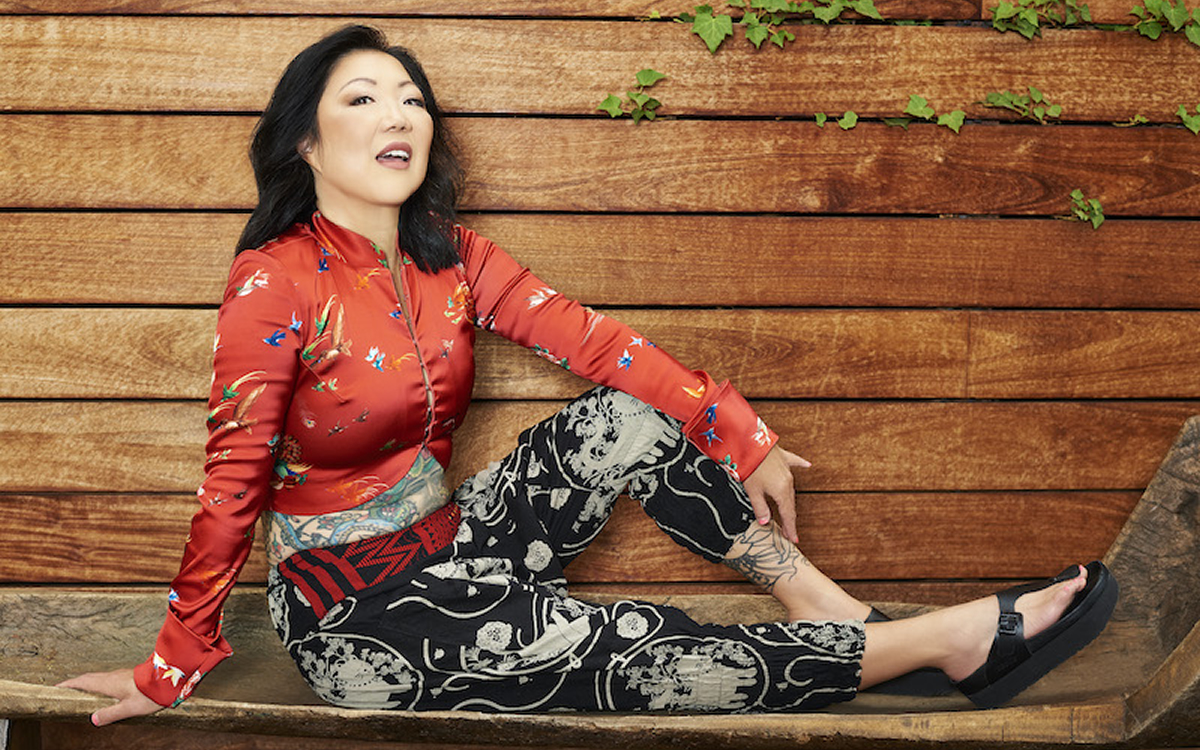
LOS ANGELES — It has been eight years since Margaret Cho released her Grammy-nominated “American Myth” album. She’s back to the music scene with her new album, “Lucky Gift,” an 11-track collection of anthems and pop tunes, a tribute to Robin Williams, and a shout-out to non-binary and gender non-conforming people.
The album captures the whirlwind that is Margaret and all of the different facets of her talents that have made her a powerhouse in entertainment and a leader in activism. In “Lucky Gift,” she’s getting her point across while having fun and getting glam.
We caught up with the activist and artist to chat about her music, our political climate, and the power of pop divas.
Known for her comedy, acting, and activism, she felt it was long overdue to get her music back out there too.
“I make music often. It’s a part of my daily life, it’s a big part of my social life, and it’s just something that I just love to do for my own relaxation and fun. I had enough for an album and I wanted to finally put them out. I was just really proud of how it all sounded together,” shares Cho.
“It’s a power pop record. For me, the songs are really meaningful. They’re all in their own way love songs. I’m a big fan of my own music (laughs), I really like the way that I sound and it’s really special to do. People know me as a comedian, and I have also made music for a long time, but it’s sort of a side project, and so it was time to put more out again.”
Her album also includes a touching tribute to Robin Williams. The entertainment community is finally more comfortable talking about mental health more openly. When relating mental health to her own life, Margaret, in true Margaret form, quickly turned the conversation to reflect today’s political climate.
“I have to maintain a level of peace and quiet and sometimes maybe get away from the news, although that’s tough because I am obsessed. I want to know what is happening. I’m really worried for our community, especially the trans community. I’m worried that this administration is trying to separate T and the Q from the LGBTQIA, and it’s really frightening.”
As an elder, Cho says she has to also remember that we’ve been through this before and it’s actually been much worse. As a community, we’ve been through a similar situation, and we were facing down a pandemic, which was killing us by the millions. So at least now we don’t have to fight AIDS as well as this onslaught of homophobia.
“We have fought for our rights, and we still have them, but we may not have them for long. So our mental health is very important to preserve now because we have to fight. The one thing to remember is they can’t do everything at once. They can’t take away trans rights, queer rights, gay rights, gay marriage, anti-depressants —ha — at the same time. So what we can do is just try to remain as calm as possible and fight as strongly as we can. But yeah, mental health is really vitally important right now.”
Margaret’s long history of queer activism stands for itself. She does not shy away from current issues, she uses her platforms to incite, educate, and question. For Margaret, there is no time off from being an activist. She was born into it, so to speak, being raised in San Francisco in the 1970s, her parents — the owners of a gay bookstore — and their employees followers of Harvey Milk.
“My activism is that I don’t have a choice. I’m going to be an activist no matter what. We’re doing this together, we’re going through this together. I will always be political. It’s just disheartening to see the ignorance of people and the lies that are being told that are believed.”
Margaret’s “Lucky Gift” comes at a perfect time when the queer community can come together over music. Cho looks at her album as a tool to empower an underdog community through the power of music.
“It’s the triumph of pop above all. We need to look to our pop divas above all. So now I’m more than ever, leaning on Madonna. [Thank God for Lady Gaga’s] “Abracadabra” because I think that things like that boost our community so much. When you can just get together and have a “brat summer,” that boosts our community so much in this togetherness, this explosion of excitement. I think Chappell Roan really ignited the pop capacity for healing. I love ‘Lucky Gift’ because it is my stepping into a pop diva moment. Pop divas should not be discounted for how important they are to our society and how much they lift us up.”
In addition to releasing her new album, Cho will continue to hit the road this year with her “Live and LIVID! Tour,” celebrating more than four decades of live stand-up shows. On this tour, she promises to rage about homophobia, sexism, racism, and the fight to stay alive. The five-time Grammy and Emmy-nominated performer is not holding back. According to her, the nation is not divided, just a little lost.
“We’re not divided. Everybody hates this. We all hate this. The fact is, the majority of the country does not want this. Unfortunately, a lot of people just didn’t vote because they just didn’t want to participate. That’s why we’re in the situation that we’re in. So to be on the road is a pleasure. And I rarely come against opposition. Every once in a while there’s something, but it’s something that we all handle. I think we all need a voice, a strong voice of reason to combat all of the hysteria.”
And her message to her fans?
“We’ll get through this. We’ll get through this with pop divas. ‘Abracadabra,’ learn the choreography, you do it sitting down. At least we have pop music, I have my hat in the ring here. But at least we have each other and we’re going to be OK. It’s going to be a ride, it’s going to be intense, but we can do this. We’ve been through this before and we are going to be fine.”
“Lucky Gift”is now available on all major streaming platforms.
-

 Opinions5 days ago
Opinions5 days agoIt’s time for new leadership on the Maryland LGBTQIA+ Commission
-

 The White House5 days ago
The White House5 days agoWhite House does not ‘respond’ to reporters’ requests with pronouns included
-

 Arts & Entertainment5 days ago
Arts & Entertainment5 days ago‘Gay is Good’ Pride Pils Can Celebrates Frank Kameny’s 100th Birthday for WorldPride in D.C.
-

 Sponsored5 days ago
Sponsored5 days agoTHC Drinks: What You Should Know About Cannabis Beverages

